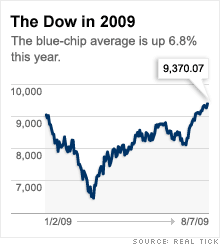Stocks back away from highs
Wall Street retreats as investors plead exhaustion after propelling the S&P nearly 50% in five months. Central bank meeting on tap.


NEW YORK (CNNMoney.com) -- Stocks slipped Monday as investors pulled back ahead of a two-day Federal Reserve meeting and following a big rally that pushed the Dow and S&P 500 to 9-month highs.
The Dow Jones industrial average (INDU) lost 32 points, or 0.3%. The S&P 500 (SPX) index fell 3 points, or 0.3%. The Nasdaq composite (COMP) dipped 8 points, or 0.4%.
Stocks have rallied on and off since March, with the S&P 500 climbing nearly 50% off its lows as investors welcomed positive earnings surprises and less-bad economic news.
Shares have also benefited from the extensive stimulus efforts, with the Fed pumping trillions into the system and the government introducing programs such as Cash for Clunkers, which has revived auto sales.
After such a run, stocks were a bit weaker Monday. But in general, the trend likely remains up for the time being.
"If someone is not going to be fully invested now, I don't know when they would be," said Will Hepburn, president at Hepburn Capital. "Everything is going up."
A summer rally could probably stretch into fall, but beyond that, stocks are vulnerable, said Dean Barber, president at Barber Financial Group.
"We've seen a little bit of good news, but we're not out of the woods yet," he said.
"Most of the earnings surprises have been from cost cutting rather than topline growth," Barber said. "And once the cost cutting and the effect of the stimulus runs its course, I can't see what's going to cause a continued run up."
Tuesday morning brings the reading on second-quarter productivity and the June wholesale inventories report.
Fed meeting: This week, the focus is on the Federal Reserve, which concludes its two-day policy meeting Wednesday.
The central bank is expected to hold rates steady at historic lows near zero. Yet, as usual, investors will be focused on what the bank will say in its statement, particularly about the health of the economy, any risk of inflation and what its exit strategy may be after putting so much stimulus into the financial system.
In line with comments from Federal Reserve Chairman Ben Bernanke, the central bank is not really worried about inflation yet. Hepburn said the bankers are not likely to say much about an exit strategy until later in the year.
The consumer will also be in focus this week, with economic reports on inflation, and profit reports from Wal-Mart Stores (WMT, Fortune 500) and other retailers.
Wall Street advanced Friday after the government's July jobs report showed unemployment fell for the first time in a year.
Company news: Merck (MRK, Fortune 500) shares gained 1.7% after Goldman Sachs upgraded it to "buy," from "not rated" according to published reports.
McDonald's (MCD, Fortune 500) reported that sales at stores open a year or more, a retail metric known as same-store sales, rose 2.6% in July, raising hopes that it will see a strong third quarter. Shares gained almost 2%.
Freddie Mac (FRE, Fortune 500) shares surged 128% in active trading Monday, one day after the government-run home mortgage lender reported its first quarterly profit in two years. The company, along with Fannie Mae (FNM, Fortune 500), was saved from extinction last year amid the credit market collapse after receiving billions in government aid. Fannie Mae gained 51%.
But a variety of economically sensitive shares fell, including Dow components Alcoa (AA, Fortune 500), DuPont (DD, Fortune 500), 3M (MMM, Fortune 500), Boeing (BA, Fortune 500) and Caterpillar (CAT, Fortune 500). Other Dow losers included Cisco Systems (CSCO, Fortune 500), Travelers (TRV, Fortune 500) and Walt Disney (DIS, Fortune 500).
Oil and gold: U.S. light crude oil for September delivery fell 13 cents to settle at $70.93 a barrel on the New York Mercantile Exchange. Oil prices have been gaining in recent weeks on bets that the global economy is stabilizing.
COMEX gold for December delivery fell $12.60 to settle at $946.90 an ounce.
Bonds: Treasury prices rallied, lowering the yield on the benchmark 10-year note to 3.77% from 3.84% late Friday. Treasury prices and yields move in opposite directions.
The U.S. government is auctioning $75 billion in debt this week as part of its efforts to fuel the economic recovery and manage the budget deficit.
Other markets: In global trading, European markets ended mixed, while Asian markets rallied.
In currency trading, the dollar gained versus the euro and fell against the Japanese yen.
Market breadth was negative. On the New York Stock Exchange, losers beat winners by a narrow margin on volume of 1.09 billion shares. On the Nasdaq, decliners edged advancers by a narrow margin on volume of almost 1.88 billion shares. ![]()
$1.2 trillion down the drain
Gas prices jump 15 cents in two weeks
Banks line up for more money
Don't get laid off
Have we hit the bottom?
GDP: Economy contracts at slower pace
Deficit: What caused it, why it matters
America's best places to live
The 2009 Fortune 500
50 years of profit swings


